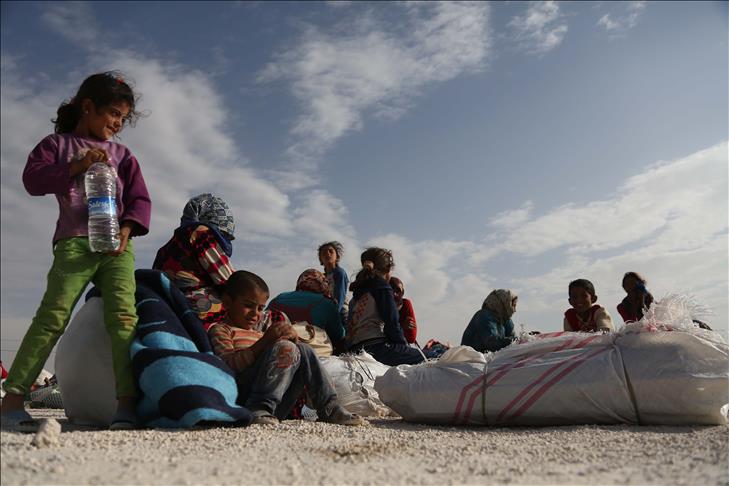
SURUC, SANLIURFA, Turkey
Some of the Kurdish refugees from Syria's northern town of Kobani who fled across the nearby Turkish border ahead of the extremist group Islamic State in Iraq and the Levant are sleeping in wedding halls, schools, parks and mosques.
Many are also sheltering in storehouses or uncompleted construction sites in the Turkish border town of Suruc, which has been at the forefront of an unprecedented influx of people.
Turkey has responded by deploying the army and humanitarian bodies to the region to build temporary shelters for the refugees.
The United Nations has claimed that more than 140,000 people crossed into Turkish territory since last week; although many are staying with relatives and some have already left the town for other cities, many are being forced to take shelter wherever they can find it.
In Suruc, a wedding hall has become home to up to 1,000 people while a mosque was packed with some 500 Syrians.

Suruc, with a regular population of 100,000 residents, has been radically changed in the wake of a refugee influx which itself has outnumbered the town’s population.
"On a summer’s day, you only see 20 or 30 people in the town center," says Yusuf Ozturk, a young Suruc resident who runs his father's print shop in the center of the town.
The green area of Suruc’s Cumhuriyet Square is home to one septuagenarian woman unlucky enough not to find relatives to stay with.
”Half of the town is away during the summer for seasonal work"
"I have no one here," she says, adding: "I get my food from this truck," pointing to a mobile aid vehicle, parked nearby.
Kardesler Mosque is seeing its busiest days as around 500 refugees take shelter in three-story building.
Ahmed, a 30-year-old singer from Kobani -- which is also known as Ayn al-Arab -- took to the mosque with his wife and three children.
"We have been miserable," says Ahmed. Although a professional singer in a town whose wedding season has just started, Ahmed admits he cannot perform at functions as he is in "deep sorrow."

Haifa Ali, a mother of five staying in the same mosque, says there is not enough space to step safely as the place of worship becomes packed with people when they come in to sleep at nights.
Across the road, a wedding hall's floor no longer hosts dancing or singing; instead it hosts refugees looking for aid from the authorities.
Next to the wedding hall, some 40 people have made themselves a home in an almost 100 square meters storehouse with only carpets on the concrete floor.
About 140,000 Syrian refugees arrived in Turkey over the weekend, the UN’s refugee agency said Tuesday, calling for more support for Ankara in its efforts to tackle the exodus.
The number represents all Europe has taken in the three years of the Syrian civil war, UNHCR chief spokeswoman Melissa Fleming stressed.

Speaking earlier this week Turkish deputy prime minister, Numan Kurtulmus, said an intense refugee flow of hundreds of thousands is possible, for which he argued Turkey is ready.
"All details have been worked out regarding a possible transfer of Syrian refugees to a further and safer location, if necessary," he added.
Kurtulmus added that some were transferred to other tent cities and refugee camps in more central regions in Turkey.
The minister maintained that they were also prepared for the worst-case scenario at a meeting held last Thursday night, before opening border crossings.
The Syrian civilians seeking shelter from the ISIL assault on their villages are being registered at a coordination center set up by Turkey's Disaster and Emergency Presidency upon entry to Turkey.
Syrian border town stands against ISIL
Claims the Islamic State of Iraq and the Levant has seized the Syrian city of Kobani have been denied by the Democratic Union Party, a Syrian-Kurd political party.
Anwar Muslim, a member of the party’s executive board, said: “We have been fighting ISIL for about six months. Some are saying that they have entered Kobani, but this is not true.”
Muslim accused the militants of cutting off electricity and water supplies and refusing to let humanitarian aid into the city, also known as Ayn al-Arab.
“ISIL is against humanity, they fight against Alevi and Sunnis, Kurds and Christians,” he said.
“Many people have left their villages, running away from ISIL. The youth took their families to Turkey and came back to fight against the terrorist organization.”
Though many have fled villages in ISIL’s path, the residents of Kobani and neighboring villages have stayed on to fight the militants, Muslim said.
ISIL’s cross-border "caliphate" has seen the killing of thousands and the displacement of millions in Iraq and Syria. To help ground forces fighting ISIL, the U.S. and its allies have conducted more than 200 airstrikes since August 7.
Anadolu Agency website contains only a portion of the news stories offered to subscribers in the AA News Broadcasting System (HAS), and in summarized form. Please contact us for subscription options.







